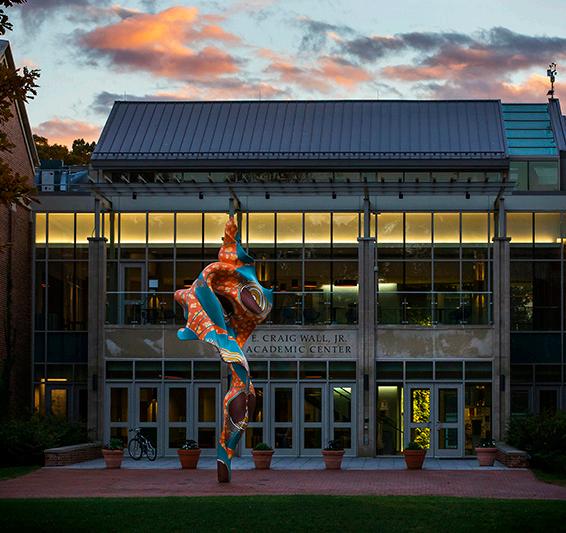
7 minute read
“Defund the Police” Perspectives 4
In recent years, this incendiary catchphrase has animated and divided American politics and public debate.
Supporters see it as a revolutionary but justified response to widespread police brutality against Black Americans. Opponents frame it as unrealistic and radical––and oftentimes advocate for even more police spending. Lost in the debate is an unacknowledged truth. Defunding the police is a fundamentally conservative idea.
Advertisement
Before Republicans became a reactionary party that used its platform to spread lies and promote hate, Republican politicians sometimes held principles—some today still claim to hold principles. One of these is the fundamental idea of fiscal conservatism, which argues that the government should prioritize balanced budgets, low government spending, and low taxes. If a public service is expensive and ineffective, the government should not spend taxpayer dollars on it. In the past, these arguments have been levied at allegedly underperforming social programs but rarely turned on defense or law enforcement programs.
Police departments across America deserve scrutiny from fiscal conservatives. Police are ineffective and, in many cases, counterproductive to public safety. There’s little conclusive evidence to show that increased police means improved public safety. One study found that an additional officer decreased a given city’s homicide rate by 0.06 to 0.1 points––however, for many American cities with majority Black populations, no decrease occurred, and arrests for petty crimes increased. Other studies find more police officers have no effect on violent crime and only result in more misdemeanor arrests. Despite this absence of evidence, 91 out of 109 city police departments increased police spending by 2% from 2019 to 2022. Cities like New York, Chicago, Los Angeles, and San Francisco have pumped tens of millions of dollars into their police budgets– yet have seen little positive change as crime rates remain high. Contrary to common perception, there is no substantive proof that increased police spending makes cities safer.
Despite this, police budgets in America remain astronomically high and are growing even larger. The combined spending on all American police departments of $115 billion is greater than the budget of every country’s military besides China. New York Police Department’s budget of $10.9 billion is alone greater than the GDP of many nations. Surprisingly, only $5.3 billion of that spending goes toward policing. The remaining $5.7 billion covers pensions,
Let me begin with what my intention in this short piece is not. It is not to say that solidarity is undesirable. The human condition, whenever and wherever it is in distress, requires unity of action; to improve things or honor age-old progress, we wish for a touch of warmth and appreciation. We need a force to move, and much of that force is provided by the people around us, the society that we think cares for us. This is what makes us human.
Much of human nature is instinctive. What I mean by human nature is not some deep psychological mind game. It is what comes to mind the instant you read the phrase itself. I mean those common human reactions to the changes in the environment: a child crying when upset, you going for lunch in Vail Commons when your stomach starts to grumble, a group of people protesting social inaction. Don’t think too far. It is simply that.
We like to think that we share too much. Any sort of similarity between us convinces us that we must respond to the conditions of others in the way they expect of us. We hope that when we become sick, the first person across the road who hears about it, even though they do not know us, will feel something for us–empathy, sympathy, whatever we prefer to call these feelings.
While this view is a possibility in most circumstances, we will be mistaken if we take it as the sole criteria to assess character. In truth, human nature can be predictable. But make no assumption that this is the rule everyone always conforms to. When you meet healthcare, and other benefits. NYPD is also notorious for consistently overrunning its overtime budget by hundreds of millions of dollars. This year, the NYPD is on track to overrun its overtime budget by more than $400 million. Some officers receive more than a full year’s salary in overtime pay on top of their annual pay.
NYPD officers are known for abusing the overtime system, by, for example, randomly arresting someone at the end of their shift to clock in more hours. Officers are incentivized to rack up overtime, as it then increases their pension payout. This leads to taxpayers subsidizing artificially-bloated pensions for tens of thousands of retired police officers— and ultimately, the situation where taxpayers have to foot an extra $5.7 billion in yearly costs to the NYPD. Overtime budget overruns are not unique to New York, as many other departments experience similar excess spending. It’s no wonder that astronomical police budgets don’t translate to public safety when all they’re doing is ensuring comfortable retirements for officers who have left the force.
If police departments were any other public service––say, food stamps or welfare––fiscal conservatives would immediately call for budget cuts. However, police spending, like tax cuts and military spending, is seemingly immune to fiscal conservative criticism.
Some may argue that being fiscally conservative doesn’t mean supporting “Defund,” as public safety is more important than prudent spending. This is a fair objection––however, as there is no proof that more spending brings about greater public safety, the point is moot. One can support all three of these ideas: greater public safety, wiser public spending, and less police funding.
Another argument may be that we should not defund the police but rather reform and fund the police differently. This argument acknowledges that current police spending is too high and doesn’t bring about greater public safety but sees rearranging funding rather than defunding as the solution. People may call for more community policing, more police someone for the first time, do not rush to the conclusion that they share your sentiments. The environments we come from are different. And even if we come from the same borough in New York or uptown Mooresville, we may never quite grasp what the other is like.
Now, some have concerns that fewer people want to befriend them because they lack some “desirable” qualities. Others have decidedly refrained from contributing to academic spaces or participating in social events. Reason: others think their views “lack a moral angle.” Where to start the conversation? Davidson values “human instincts,” “deep sincerity,” and “intellectual bravery.” I believe that these ideals make Davidson’s experience a “truth” richer like no other. Therefore they must mean that every student here has a space. Everyone is welcome. Personally, I see Davidson as a club where freedom is served to whoever wants it. Since our academic growth and professional curiosity mostly depend on this freedom, the only reasonable thing to do is take vast advantage of it whenever you can.
Now, we must not assume that everyone lives solely by Davidson’s ideals. People have personal values, which, if not reflected in another person, tend to undermine compatibility. We should not squeeze ourselves into relationships in which we are not welcome. And perhaps we should not always be too comfortable with the idea that the other person is always going to be who we want them to be. Friendship is a territory built upon trust, and sometimes that means seeing the other for who they really are without really trying training, and reforms to qualified immunity. so hard to convert or convince them. Maybe give them space; they will decide whether to accommodate our beliefs by simply spending time with us. That, a change of beliefs, is entirely up to them. It is their prerogative.
Specific police reforms are undoubtedly necessary––such as ending qualified immunity, a longstanding doctrine that enables police brutality and violates citizens’ rights. Other reforms, like community policing and more police training, still don’t increase public safety. For example, after Minnesota police murdered Philando Castile in 2016, the state invested $12 million in police training, requiring officers to complete 1,000 hours of training. This did not prevent police there from murdering George Floyd in 2020 and again killing Daunte Wright in 2021. Community policing, an approach that emphasizes the police’s connection to a neighborhood and its residents, also has been proven not to build trust or reduce crime. Merely shifting police budgets around runs into the same issues as before: inconclusive evidence that such programs reduce crime and failure to address the astronomical budgets of police departments.
The real reason fiscal conservatives don’t support defunding the police is simple: politics. Any association with the “Defund the Police” slogan is politically radioactive. Such weaponization of the term renders any sensible discussion about police reform impossible. Further, fiscal conservatives do not actually exist in any consistent bloc. Fiscal conservatives are conservative when it comes to spending on social programs like welfare, food stamps, housing vouchers, and social security––but when it comes to defense spending, police spending, and tax cuts, they’re as wasteful as the liberals they criticize.
Clyde Dwywer ‘25 (he/him) is a Philosophy, Politics and Economics major from Brookyln, New York. He works at his family’s bakery in Queens, New York. He can be reached at cldwyer@davidson.edu.
College is a labyrinth of possibilities and growth. Certainly, not everyone will leave this place with the same beliefs they brought with them. We come with reservations, we get molded, we agree to what we can, and maybe, just maybe, we even leave without anything about us changing. The capacity to be in the other’s shoes is a matter of choice, one that derives heavily from years of hard-earned individual experience and independent thought.
As much as we desire that unity of action and con- gruity of spirit, we must also remember that each of us has an individual side of affairs. Aside from our human similarity, we have identities that are only, and only, for us. It is a breach of human dignity to think that we can easily soothe others into what we think is right or wrong.
Frank Edong’a ‘25 (he/him) is a Philosophy major from Turkana, Kenya. He can be reached at fredonga@davidson.edu.

Davidsonian The Staff
Brigid McCarthy ‘25, Katie Stewart ‘23
Georgia Hall ‘25
Nada Shoreibah‘23
Gray Eisler ‘24, Bilal Razzak ‘25
David Sowinski ‘25
Campbell Walker ‘25
Andrew ElKadi ‘23, Varun Maheshwari ‘23
Nora Klein ‘24
Josie Hovis ‘23, Skylar Linker
Bailey Maierson ‘25
Ben Gordon-Sniffen ‘23
Sahana Athreya ‘25
Sierra Brown ‘25
Isabelle Easter ‘25, Bailey Maierson ‘25
Anaya Patel ‘25






